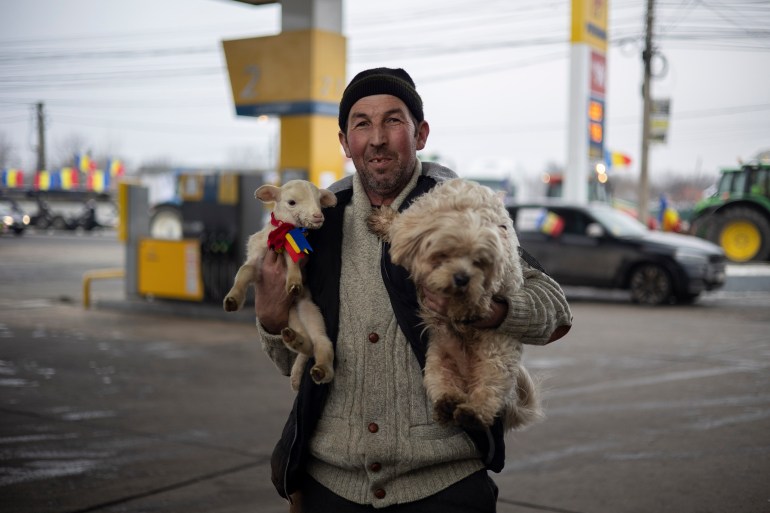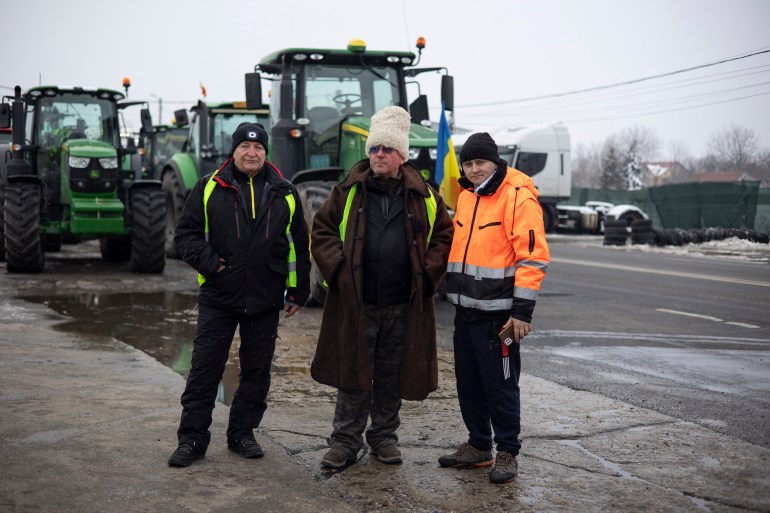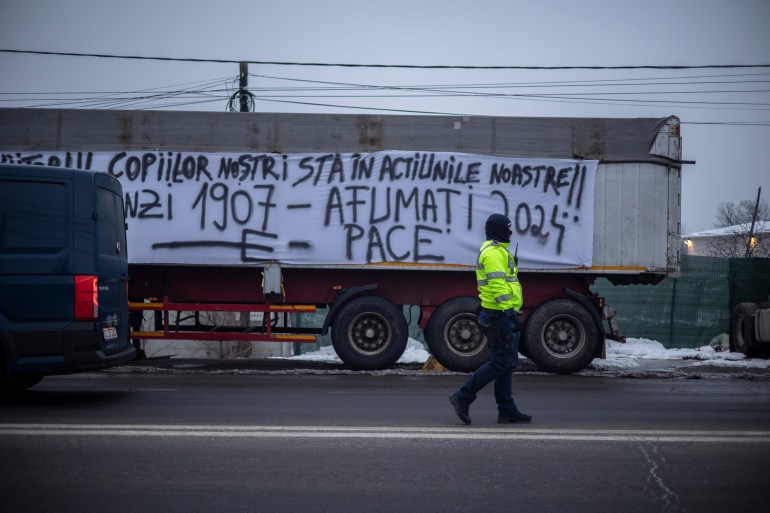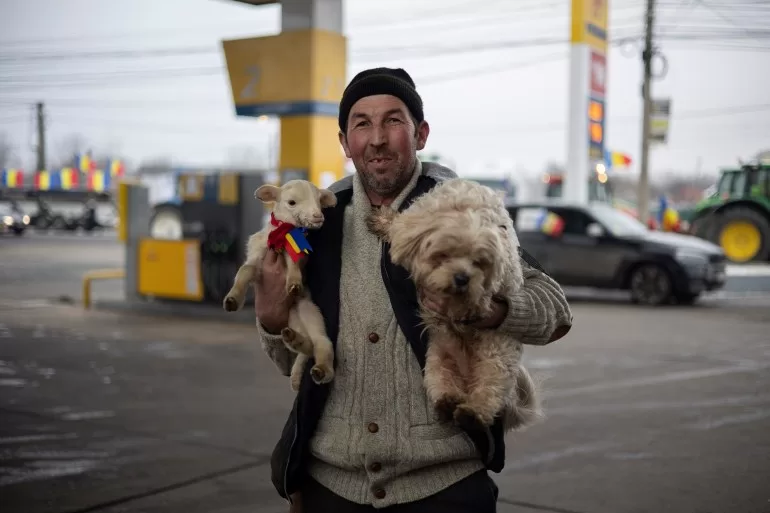“We became Europe’s slaves”, said Ghiocel, 47, his cheeks rosy from the freezing late January temperatures, as he stroked the young animal. “That is no longer possible!”
Beside him, a man waved a flag while the few dozen tractors and trucks disrupted traffic and honked incessantly.
“We have all that expensive diesel, gas, insurance … We, in our country, have everything and we end up working elsewhere,” Ghiocel said, referring to the migration of five million Romanians in the past three decades.

Walking among the crowd wearing a white woollen hat and a yellow visibility vest, Danut Andrus, an agricultural entrepreneur from Botosani, captured videos and uploaded them to his TikTok page with the hashtag #fermieri (“farmer” in Romanian). Some of his videos garnered more than 300,000 views.
Word about the farmers’ plight has been capturing a wider audience.
In Romania, the European Union country with the highest number of farmers (about 3.5 million, according to the European Commission), members of the agriculture and transportation sectors have been protesting since January 10, often in groups of tractors and trucks in locations around the country.
Their 47 demands, which are outlined in a 20-page document submitted to the government, include reducing diesel tax, lowering mandatory civil liability insurance for motor vehicles (RCA) and ending what is seen as unfair competition from Ukraine where drivers have fewer operating costs and don’t require transport permits to operate in the EU (this was lifted by the bloc following Russia’s invasion of Ukraine in 2022).
“It all began with a WhatsApp group,” remarked Andrus. He’s become one of the faces of the protest, negotiating the farmers’ claims with the Romanian government. He even attempted to establish a political party to advocate for farmers, he told Al Jazeera, but it was unsuccessful.

A protest planned for Bucharest on January 10 ended up on a road about 20km (12 miles) from the capital near a commune called Afumati, after some protesters were denied entry by police because they lacked authorisation. When permission was finally granted by the local government on January 21, the protesters alleged political interference from the far right and remained at Afumati.
On January 14, Romanian farmers also blocked the Siret border crossing with Ukraine and two entrances to the Romanian Black Sea port of Constanta, a key transit hub for Ukrainian grain.
The protesters’ concerns are also shared by some Romanian residents who are not farmers.
“[Vehicle] insurance is so expensive”, said Deaconu, who drives a taxi for Bolt. He and other drivers agree with the farmers’ claims, but do not participate in the protests.
There have also been accusations that many protesters “are not ordinary peasants, but rather small to medium-sized businesses in those sectors” with land and expensive farm equipment, explained Sorin Ionita, a consultant from the World Bank Group in Romania.
Rising discontent
Discontent among farmers across Europe has been escalating in recent months.
It began in 2019 with Dutch farmers blocking roads across the Netherlands to protest government plans to limit nitrogen emissions. Rallies ramped up in late 2023. In late December, Polish truck drivers blocked the Medyka border crossing with Ukraine, demanding that permits be reinstated for Ukrainian drivers. Then, in early January, Polish farmers took to the streets protesting against cheap imports. On January 15 in Germany, 10,000 farmers — accompanied by 5,000 tractors — rallied in Berlin against plans to cut agriculture fuel subsidies.

Videos of the protests have gone viral on social networks. A clip of tractors blocking a road in Germany garnered more than seven million views on TikTok, and footage of French farmers dumping manure and straw on a government building surpassed one million views. A video compilation of tractors blocking roads in several countries – accompanied by the message “IMPRESSIVE. The revolution of all of Europe against the governments, the EU and the 2030 agenda” – circulated widely on WhatsApp.
The most violent protests have been in France, the largest agricultural producer in the EU. Since mid-January, thousands of farmers have blocked roads, burned tyres and spread manure at the entrances of various administrative buildings across the country. In southern France, protesters vandalised goods on several trucks transporting wine and vegetables from Spain and Morocco to protest against cheap imports, according to the Spanish Confederation of Freight Transport (CETM).
French farmers contend that the government of President Emmanuel Macron is addressing inflation at their expense, forcing food producers to cut prices. They also decry low wages and excessive bureaucracy, and have concerns regarding repercussions of the EU’s green policies, which include the requirement to leave four percent of land fallow to promote biodiversity or the reduction of chemical pesticides use in order to receive European aid.
Among other claims, France’s largest farm union, FNSEA, called for a reconsideration of “the very philosophy of the Green Deal which assumes degrowth must be reviewed to restore visibility to farmers”.
A recent poll revealed that 82 percent of French people support the farmers’ movement.
Olivier, who works at a vegetable stand on Mouffetard Street in Paris, agrees with the protests, saying that the EU demands more of France when it comes to climate goals. He pointed to two boxes of mandarins, one from Italy at 5.80 euros ($6.30) per kilogramme and one from France, at 7.90 euros ($8.57). French farmers argue that their vegetables are more expensive because they use fewer pesticides.
Paradoxically, food prices are higher for consumers, but the benefit for farmers is diminishing. French ecologist and MEP Yannick Jadot recently declared on the Franceinfo network that one-third of French farmers live below the poverty line, and two farmers commit suicide per day, citing data from the Mutualite Sociale Agricole (MSA).
The farmer protests are the first challenge that Gabriel Attal, France’s new prime minister, has faced. He responded on January 26 by reversing the plan to raise taxes on agricultural fuel.
![Tractors protest at Afumati on January 23 [Lola García-Ajofrín/Al Jazeera]](https://www.occasionaldigest.com/wp-content/uploads/2024/01/afumati-F09A1884-1706468848.jpg)
Tractors go viral on TikTok
Populist parties have been accused of exploiting the farmers’ anger. “It is not just that they use the protests, but they also fuel them,” explained Claudiu Craciun, a lecturer at the National School of Political Science and Public Administration in Bucharest. “I have seen for months on social media how the far-right groups keep sharing the posts of the Dutch and German protests.”
However, Craciun noted that protesters don’t want to be associated with the far right.
After learning that a request to protest in the capital on January 21 had been presented by a lawyer close to Romanian far-right Senator Diana Sosoaca, very few protesters attended the event in Bucharest’s Constitution Square, which was authorised for up to 5,000 people and 100 tractors. Just one tractor showed up.
European parties are cautiously observing protests ahead of the European Parliament elections in June, where projections see “a major shift to the right”, according to a recent survey conducted by the European Council on Foreign Relations (ECFR).
The survey indicates that anti-EU populists are likely to lead in nine countries (Austria, Belgium, the Czech Republic, France, Hungary, Italy, the Netherlands, Poland and Slovakia) and secure second or third positions in nine more.
Social media plays “a large, if sometimes toxic role” in elections, said Mihnea Dumitru, a political analyst based in Bucharest, who has a PhD on the influence of the internet in Romanian elections. “There is a lack of moderation on these networks, not enough effort from their companies or even local civil society towards fighting fake news,” he said.
Dumitru points to “secret” Facebook groups that spew racist propaganda in Romania and to TikTok and YouTube videos “with dodgy political messages that are marketed as funny, instead of worrying”.
And, “with the advent of video content and preferences towards more polarised politics, TikTok has recently taken the crown” as the fastest growing app among Romanians, Dumitru added. TikTok’s user base in the country surged from 175,000 in 2019 to 7.58 million in 2023, according to DataReportal, with a notable increase of 1.2 million users between 2022 and 2023.
France has the most active TikTok users (21.4 million) in the EU, followed by Germany (20.9 million) and Italy (19.7 million), according to TikTok’s full DSA Transparency Report for 2023.
Dumitru credits the availability of cheap and fast mobile internet in rural Romania for allowing “massive online communication” about the protests.
In the biggest election year in global history, Romania is hosting four elections, including local, presidential and parliamentary, as well as the European Parliament vote in early June.
Dumitru explained that right-wing parties “have ballooned in electoral intention because they carried general dissatisfaction to the public forum”. He noted that the surprising aspect of these protests in Romania was “how fast these parties tried to assume control over them and miserably failed”.
